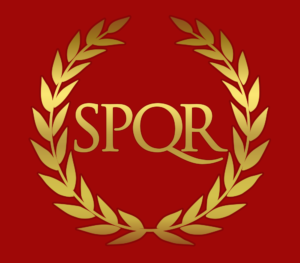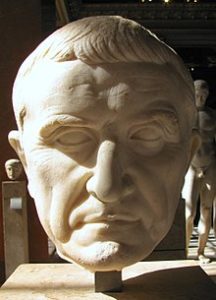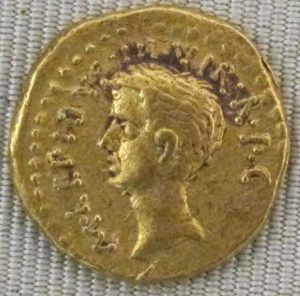The last days of the Roman Republic, that’s what the Brexiteers remind me of ( hey, if you’re going to be grandiose, you may as well be epic ). I think  what prompted the comparison was the mention of law suits, stock political weapon of choice in the Rome of the last century BCE and resorted to when all else has failed in terms of making Boris Johnson accountable for his actions ( the unreimbursed investors in the Garden Bridge and BrexitJustice ).
what prompted the comparison was the mention of law suits, stock political weapon of choice in the Rome of the last century BCE and resorted to when all else has failed in terms of making Boris Johnson accountable for his actions ( the unreimbursed investors in the Garden Bridge and BrexitJustice ).
Other comparisons quickly sprang to mind – the patrician Marcus Licinius Crassus, he who made his great wealth through speculation (in his case in real estate) must be Jacob Rees-Mogg, someone who simultaneously increases his political capital while at the same time increasing his actual capital. A would be triumvir who is never quite as well-regarded by his peers and contemporaries as he would like to be, never really being a candidate for acknowledged leader (the Licinii were, after all, of plebian stock originally and were never quite as patrician as they wanted to be, Crassus’ affectations notwithstanding).
real estate) must be Jacob Rees-Mogg, someone who simultaneously increases his political capital while at the same time increasing his actual capital. A would be triumvir who is never quite as well-regarded by his peers and contemporaries as he would like to be, never really being a candidate for acknowledged leader (the Licinii were, after all, of plebian stock originally and were never quite as patrician as they wanted to be, Crassus’ affectations notwithstanding).
But who today are the populares, those politicians who espouse the cause of the plebians , the ‘common people’, despite their own privileged backgrounds? The queue is a very long one – just about everyone claims to know the ‘will of the people’ these days.
There are the ‘Bad Boys of Brexit’ – Aaron Banks fits neatly into the role of Titus Annius Milo, street-gang cultivating bully boy, or is that Nigel Farage, with Banks as his backer, a tiny bit like Pompey, in that he seems to have imported the funds he used to do so from foreign climes, just as Pompey did (including diamonds). But then Pompey was a successful general who really did have massive wealth, so there the  comparison ends. There’s David Davies, a Lepidus if ever there was one, in that he enjoyed the trappings of power but had no known function to support his formal title – for Master of the Horse read Brexit Secretary. ‘A slight, unmeritable man, meet to be sent on errands‘ Mark Anthony calls Lepidus (Julius Caesar) or would this better fit Liam Fox – who has no discernable purpose at all, given that the UK is not permitted to unilaterally negotiate trade deals at the moment and may not be able to in the future – an errand runner indeed.
comparison ends. There’s David Davies, a Lepidus if ever there was one, in that he enjoyed the trappings of power but had no known function to support his formal title – for Master of the Horse read Brexit Secretary. ‘A slight, unmeritable man, meet to be sent on errands‘ Mark Anthony calls Lepidus (Julius Caesar) or would this better fit Liam Fox – who has no discernable purpose at all, given that the UK is not permitted to unilaterally negotiate trade deals at the moment and may not be able to in the future – an errand runner indeed.
I’m sure Johnson would clutch as the mantle of Caesar, rather as he tries to position himself as another Churchill, though the only thing I think he has in common with the Dictator is the stabbing in the back he received, albeit metaphorical, from his erstwhile ally when he was thought to be about to ascend to power. No, Johnson is more of a Publius Clodius, someone prepared to shed all his former trappings – his patrician status, his family – in Johnson’s case his U.S. citizenship, his wife – in pursuit of power.
 So is Michael Gove Brutus, the ‘noblest Roman of them all’? He seems to have the somewhat prissy self-regard which Shakespeare gives Brutus, but I’m afraid I see him rather as Gaius Cassius Longinus, the politician and would-be philosopher who used the discipline to justify assassination and who eventually sacked the island of Rhodes where he had studied philosophy. Caesar says that he ‘thinks too much; such men are dangerous‘ (Julius Caesar) and Gove had used to cultivate his image as an intellectual, yet now he claims that ‘experts’ are unwanted and unneeded.
So is Michael Gove Brutus, the ‘noblest Roman of them all’? He seems to have the somewhat prissy self-regard which Shakespeare gives Brutus, but I’m afraid I see him rather as Gaius Cassius Longinus, the politician and would-be philosopher who used the discipline to justify assassination and who eventually sacked the island of Rhodes where he had studied philosophy. Caesar says that he ‘thinks too much; such men are dangerous‘ (Julius Caesar) and Gove had used to cultivate his image as an intellectual, yet now he claims that ‘experts’ are unwanted and unneeded.
To read about these characters ( in English ) try Tom Holland’s Rubicon (Abacus, 2004), or, in fiction, the Robert Harris Cicero trilogy, Imperium, Lustrum and Dictator (Arrow, 2018).
For more on Brexit try End Game Unravelling fortunes… It’s All About the Money Not fit for office?


 RSS – Posts
RSS – Posts
One response to “The Last Days of Rome (Brexit)”